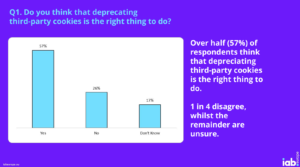Table of Contents
As you may already know, the digital marketing landscape is undergoing significant changes due to major browsers such as Google and Apple phasing out third-party cookies. While it faces many barriers and opinions, research from IAB Europe suggests that over half of industry professionals in Europe think deprecating cookies is the right thing to do, and 1 in 4 people disagree, whilst the remainder are unsure.

The decline of third-party cookies began in 2020 when Firefox and Safari started blocking its usage. Now, Google has announced that it is postponing the stoppage of third-party cookies for Chrome until 2025. The original plan was to end it by the close of 2024, but a more specific date has yet to be determined.
While integral to internet functionality, cookies pose privacy concerns as they track user activity. First-party cookies, directly stored by visited websites, offer functionalities like analytics and language settings, while third-party cookies, set by external service providers, enable cross-site tracking. You can read more on the difference between first-party and third-party cookies on our The cookieless world: first-party data meets CDP article.

Google has postponed the phase-out of third-party cookies for the third time despite promising to do so within two years starting in January 2020. The delay is to provide more preparation time for the advertising industry, which has been surrounded by many uncertainties.
01
of 04
Why Does Postponing Matter for Marketers?
It matters because brands now will have extra time to get ready and explore alternatives to third-party cookies… But don’t forget it – it’s just a delay so it’s still going to happen sooner or later. They will go away, just not right now. Despite this delay, Google did not provide a timeline for saying bye-bye to third-party cookies but they expressed hope for completion by 2025.
Businesses in the digital advertising industry are heavily reliant on third-party cookies, with around 50% of them being prepared for the upcoming deprecation, while the other half is not yet ready to tackle the issue. A significant proportion of businesses, just over a third, still need to work on their preparation measures, as stated in the Industry Readiness Survey Results in February 2024.
Most marketers have moved away from third-party cookies in recent years and have replaced its function with different success metrics
02
of 04
Why the Delay on Third-Party Cookies Blockage?
Well, it can be attributed to three main reasons.
-
Reliance on Google’s Third-Party Cookies
As we’ve said, third-party cookies are crucial to marketers and ad agencies because they heavily rely on them to measure campaign success.
As cookies are being phased out, many marketing agencies are unsure of what alternative to use in the future. According to Get App, 41% of marketers believe their biggest challenge will be their inability to track the right data.
WARC attributes these statistics to a lack of awareness and overall knowledge of what alternatives there are to using third-party cookies. In a cookieless world, marketers will need to find new ways to connect with customers and build trust with them so they continue to opt-in to sharing information.
The level of uncertainty surrounding what happens after third-party cookies means a further delay is only a good thing for marketers, as it’s clear more time is needed to outline a clear plan of action once cookies are deprecated.
-
Competition and Markets Authority concerns
The Competition and Markets Authority (CMA), a UK regulatory body, has expressed concerns regarding the decision to eliminate third-party cookies from websites. The CMA is worried that this move may affect Google’s competitors negatively and feels that the delay in implementing this change allows for more time to investigate the implications. The primary concern is that this decision may have been taken to boost Google’s advertising business while harming other web advertisers.
Consolidation of market power in favor of Google is what the CMA is desperately trying to avoid. They believe that without third-party cookies, publishers will struggle to successfully monetize their websites.
“We remain committed to engaging closely with the CMA and [UK privacy regulator Information Commissioner’s Office] and we hope to conclude that process this year,” Google said in a Privacy Sandbox progress report to the CMA. “Assuming we can reach an agreement, we envision proceeding with third-party cookie deprecation starting early next year.”
Even with CMA’s step-backs, Google had planned to disable third-party cookies for everyone by the end of the year to face the concerns surrounding third-party cookies would tilt the competition too far in favour of Google Ads.
Google acknowledged that it couldn’t meet its self-set deadline to go live with its alternative to third-party cookies, Privacy Sandbox. UK advertisers are testing it now and will provide feedback to the CMA by the end of June to analyze how it affects competition in the UK web-ad marketplace. Google even agreed to fund the testing.
-
Google’s Privacy Sandbox Initiative
Ultimately, the motivation behind removing cookies is to replace them with their own Privacy Sandbox Initiative. This initiative aims to allow websites to access user information without invading privacy, enabling online advertising by sharing user data without using third-party cookies. As said by Google:
The Privacy Sandbox initiative aims to create technologies that both protect people’s privacy online and give companies and developers tools to build thriving digital businesses.
The Privacy Sandbox has two core aims:
- Phase out support for third-party cookies when new solutions are in place.
- Reduce cross-site and cross-app tracking while helping to keep online content and services free for all.
Without a doubt, the ones who will benefit the most from this delay are Google themselves and not marketers (as we would assume). It is crystal clear that they need ample time to thoroughly test the Sandbox technology and obtain feedback from industry stakeholders and regulators because they are currently facing criticism.
The report Fit Gap Analysis for Digital Advertising, stated that “in its current form, the Privacy Sandbox may limit the industry’s ability to deliver relevant, effective advertising, placing smaller media companies and brands at a significant competitive disadvantage.”
03
of 04
Why You Don’t Have to Panic about the Third-Party Cookies Stoppage
-
CHIPS in Salesforce Marketing Cloud Engagement
Marketing Cloud Engagement currently uses third-party cookies to track users’ interactions with your websites. If you were already considering investing in the #1 CRM in the world – Salesforce – this is a good time to find your Salesforce Partner (like us!) because we are ready for this change.. You will have access to the same engagement data that you’ve always had since Marketing Cloud Engagement uses partitioned cookies, sometimes known as Cookies Having Independent Partitioned State (CHIPS).
Check out Salesforce’s example:
Imagine cookies as little trackers that websites use to remember you (which they are). Normally, when you visit different sites, these trackers can follow you around and gather information about what you do.
Now, let’s talk about partitioned cookies such as CHIPS. Think of them like separate compartments for each website you visit. So, when you go to dreamhouserealty.com and it uses a tracker from webtracker.example, that tracker can only see what you do on dreamhouserealty.com.
Later, when you visit ursamajorsolar.com, which also uses the same tracker from webtracker.example, it can’t see what you did on dreamhouserealty.com because of these separate compartments. So, even though the tracker is there on both sites, it can’t connect your activities from one site to another.
-
Google is not going to stop tracking (entirely)
Now that you know about Google’s Privacy Sandbox, this one seems pretty obvious. While Google will stop tracking people at an individual level, it will still invest in alternatives, such as FloC, which tracks groups of people rather than individuals. As stated on “Building a privacy-first future for web advertising” article by Chetna Bindra at Google:
FLoC can provide an effective replacement signal for third-party cookies. Our tests of FLoC to reach in-market and affinity Google Audiences show that advertisers can expect to see at least 95% of the conversions per dollar spent when compared to cookie-based advertising.
-
User privacy will improve
Like it or not, Google and the other browsers who have already stopped using third-party cookies have taken a bold stand for user privacy. There are still alternatives that will help you track your data, and while these options may be different or require a new strategy, you will still be able to target your audience without breaking a person’s privacy.
-
Your customers want your content to be relevant – so make it relevant!
04
of 04
How You Can Prepare for the Third-Party Cookies Blocakage
With Salesforce Salesforce Customer Data Platform (CDP), businesses can effortlessly build audience segments and optimize strategies in real-time. The platform allows for seamless integration of data from disparate sources, empowering businesses to reach customers at every stage of their journey.
Additionally, the inclusion of AI features enables businesses to connect customer data with their engagement behaviour, further enhancing personalized interactions. Utilizing advanced analytics tools such as machine learning provides a deep understanding of customer data. This centralized platform enables companies to create a complete view of their customers, facilitating personalized engagement across the organization.
There has been a lot of talk about Customer Data Platforms (CDPs), such as Salesforce Data Cloud, over the past two years. By using Data Cloud, you can get more value from the data you already have. Instead of keeping your data in separate silos, you can centralize your first-party data from multiple sources. This will help you get more out of your data and might be the solution for this third-party cookies depreciation!
In light of the gradual phasing out of third-party cookies, some actions needed to be taken regarding Salesforce marketing tools. As Google is the world’s leading search engine, you could argue that we marketers now have more time to finalize technological changes. But never forget, this is only a delay.
Now you know why Google has postponed the cookies stoppage. If you believe the implementation of a Salesforce solution such as Data Cloud would be an advantage to solve your marketing challenges, we are here to help. Feel free to contact us! And also, don’t forget to subscribe to our Knowledge Center.







